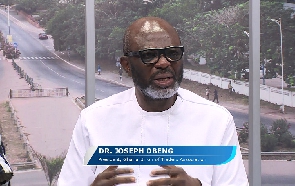- Home - News
- TWI News | TV
- Polls
- Year In Review
- News Archive
- Crime & Punishment
- Politics
- Regional
- Editorial
- Health
- Ghanaians Abroad
- Tabloid
- Africa
- Religion
- Election 2020
- Coronavirus
- News Videos | TV
- Photo Archives
- News Headlines
- Press Release
General News of Tuesday, 18 March 2003
Source: THE EVENING NEWS
No Men Of Honor Still?
More than two years after promising to set up an Office Accountability at the Presidency to regulate the conduct of ministers and official appointees to enhance the policy of zero tolerance” for corruption, the said office appears not to be materialising.
In the second half of last year, the Chief of Staff, Kwadwo Mpiani, explained that although the President was committed to making good his pledge to the nation on the matter, in order to ensure discipline amongst his ministers and functionaries, the difficulty was in finding the right calibre of Ghanaians who were untainted politically and could not be influenced into shielding anybody.
Several months after that pledge, the Office of Accountability is yet to be established and tongues are wagging as to whether the President as in Biblical lexicology has not “found even three righteous men in the land” who command enough political and civil respect and would not succumb to corruptible practices to man that office.
With calls to reshuffle ministerial appointees and the outright removal of others, particularly District Chief Executives (DCEs) for abuse of office and irregular practices, it has become very crucial to query what is going.
When “The Evening News” contacted the Chief of Staff on the matter, he was elusive and could not offer any explanation for the delay in setting up the office at the Presidency. About eight months ago, precisely on 19 August 2002 “The Evening News” carried a report on the front page captioned “Accountability Office in the offing” in which the Majority Leader, Papa Owusu Ankomah, affirmed the readiness of the government to establish that office.
He told an audience at a public lecture on “Anti corruption” in Accra that the government policy of “zero tolerance” for corruption was not just rhetoric but a practical policy which was yet to be operationalised.
According to the Majority Leader, about 20 per cent of procurement costs go into private pockets of civil servants rather than to politicians as erroneously believed by the general public. Among other things he called for a review of laws which hindered the fight against corruption and reformation of corporate governance policies which were outdated and faulty.










